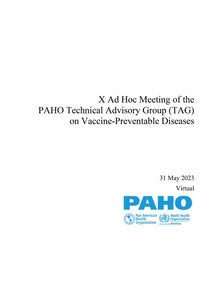In July 2021, the Technical Advisory Group (TAG) on Immunizations for the Americas stated, "The Region is facing an impending crisis around routine vaccination." At that time, 1.7 million children younger than one year in the Americas (14%) had never received a single dose of vaccine. Brazil and Mexico reported about half of this figure. Across the Region, 2.7 million children in the same age cohort – nearly one in five – were under-vaccinated. One year later, in July 2022, the United States reported its first case of vaccine-derived poliovirus type 2 (VDPV2) since 2013. One month later, Canada reported positive wastewater samples for circulating VDPV2. In March 2023, Peru reported one confirmed case of VDPV1—a zero-dose child with no history of travel in the province of Loreto, on the border with Brazil and Colombia. During its last meeting, the TAG recommended countries and territories focus their political, technical, and financial commitment to halt the decline in vaccination coverage by December 2023. Given the risk of importation and emergence of global circulating vaccine-derived poliovirus (cVDPV), countries that have not yet introduced the second dose of inactivated polio vaccine (IPV) should do so immediately to reduce the pool of children susceptible to poliovirus type 2 (PV2). During the 31 May 2023 meeting, the PAHO secretariat presented to TAG members an update on the polio situation in the Americas. The secretariat proposed the co-administration of oral polio vaccine (OPV) and inactivated polio vaccine (IPV) in response to polio events or outbreaks to continue closing immunity gaps as quickly and effectively as possible and to bolster immunity in hard-to-reach populations. Additionally, the secretariat provided the latest information on whole-cell pertussis (wP) hexavalent vaccine and asked TAG members to provide considerations for the PAHO Director, Dr. Jarbas Barbosa, to guide countries and territories that are evaluating its introduction in the national immunization schedule. Finally, the TAG recommended the use of a one-dose HPV vaccination schedule for all girls 9 through 14 years of age if the immunogenicity of the vaccine product and long-lasting immunity conferred by the one-dose schedule have been documented.
|

